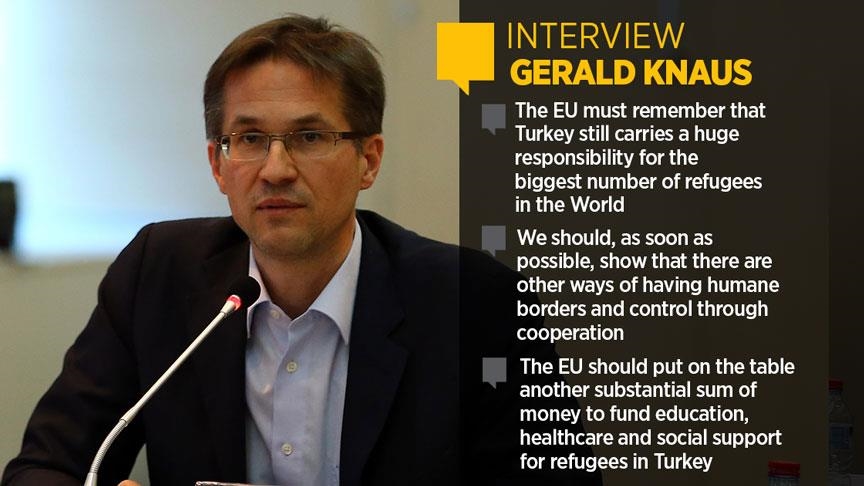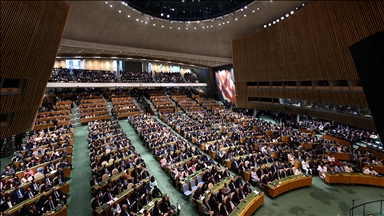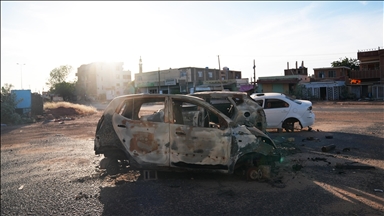INTERVIEW - Humane borders, control through cooperation possible: Turkey, EU can show the way
In an interview for Anadolu Agency, Gerald Knaus, the founding chairman of European Stability Initiative (ESI), answered questions on a March 2016 agreement between Ankara and Brussels to end irregular migration from Turkey to EU

Zeliha Eliacik is a researcher at SETA's Directorate of European Studies, working on Orientalism, minorities in European and Muslim societies, Islamophobia and the foreign policy of Germany.
ISTANBUL
In an interview for Anadolu Agency, Gerald Knaus, who is the architect of the EU-Turkey Statement, agreed on March 18, 2016, to end irregular migration from Turkey to the EU answered questions on what has happened since the statement, whether any real progress has been made, and what lies ahead for Turkey and the EU. The 2016 statement set out a roadmap to improve living conditions for Syrian refugees in Turkey and open up organized, safe and legal channels to Europe for them.
Zeliha Eliacik: How do you assess the last five years in the frame of the EU-Turkey Statement?
Gerald Knaus: We have had two moments in the last five years when the number of refugees crossing in boats from Turkey to the EU has gone down quickly. Two moments which could not be more different in how they were achieved. In March 2016 the EU and Turkey reached the 18th March EU-Turkey Statement and the number of people who crossed from Turkey to the EU went from one million in 12 months before, to 26 thousand in the 12 months after this. This was through cooperation, the EU raising money to support refugees in Turkey, the EU promising to take refugees from Turkey and Turkey saying that, from a cut-off date, the 20 March, it was prepared to take back migrants which the Greek asylum system determined could be returned according to EU and international law. This agreement reduced irregular arrivals and reduced the number of deaths in the Aegean drastically. In the 12 months before more than 1,100 people died, in the 12 months after that, it was around 80. This diplomatic breakthrough saved lives.
Now look at the second moment of reductions, which happened a year ago. In the 12 months before March 2020, around 62,000 migrants reached the Greek islands through Turkey. In the last 12 months it was less than 3,000. The problem is that the way this was achieved was not through cooperation between the EU and Turkey. There were no returns. It was through pushbacks and deterrence alone.
What happened five years ago was a “win” for Turkey, “win” for the EU and “win” for the global refugee protection system, which the EU pledged to uphold in the Statement. What we had in the last 12 months was “lose lose lose”: No more promises of additional funding from the EU, a deep crisis of the rule of law in the Aegean, instead pushbacks and erosion of the non-refoulment principle that is at the heart of the European Convention on human rights and the refugee convention.
Zeliha Eliacik: Where do you see the biggest problem when it comes to the implementation of the EU-Turkey Statement?
Gerald Knaus: One thing, which never worked as it should, was returns from Greece to Turkey. 143,000 people arrived on the islands until December 2019 and until then 2,000 people were returned to Turkey (44 per month). This created a constant crisis on the Greek islands where people were kept for much too long under very bad conditions although in the end very few were ever returned. This should and could have been addressed, though, in line with international law. In the last 12 months, the methods used to reduce arrivals mark a sharp change. This has been widely reported on by international media, warned about by international organizations, described by NGOs. The Turkish coast guard estimating that some 9,000 pushbacks have taken place at sea last year.
Right now, there is no promise of more money for refugees in Turkey for the coming years, as there was in March 2016. There is still a low number of people who will be settled from Turkey. The status quo is also worse for Greece, with a continuing bad situation on the islands.
Anyone like myself who wants the EU to stick to its core values, to respect the European convention on human rights, not to do pushbacks and to respect the refugee convention must be worried. But any alternative must work for both Turkey and Greece.
Zeliha Eliacik: Which components of the statement were easier to achieve? Which aspects were disappointing for the EU/Turkish side? Why?
Gerald Knaus: At many EU borders, from Hungary to Croatia to Greece, European law, the refugee convention and the European convention on human rights are violated. My colleagues and I have been warning about this for the last five years. If democracies are fearful of losing control and determined to stop migrants, they can do it. But to do it in line with the European convention on human rights and the refugee convention requires effort and partners. Getting used to a strategy of pushbacks to deter arrivals is a terrible signal in the 70th year of the UN refugee convention.
Zeliha Eliacik: Should there be a renewal? Could you explain why?
Gerald Knaus: The agreement should be updated so it can work for all. The biggest threat is that as we don’t get a revised statement soon, and the number of people in the EU who get used to the current policy of pushbacks will grow. People in Europe might say what Trump did on the US-Mexican border was brutal, but it worked, as very few people crossed the Mexican border in 2020. President Biden has not changed the core of Trump’s policy either so far; people are still being pushed back daily. For him to do so, the US needs something like an EU-Turkey statement with Mexico, Costa Rica; it needs resettlement and fast asylum and returns. But if both the US and the EU just close borders, the refugee convention and non-refoulment drown in the Aegean and in the Rio Grande. We should, as soon as possible, show that there are other ways of having humane borders and control through cooperation. Turkey and the EU can show the way.
Zeliha Eliacik: What should be the extent of the renewed statement? (What should be its content? Why? Who should be the partners? Why?)
Gerald Knaus: The EU should have the same courage and vision it had when agreeing on a realistic interest-based and value-driven new statement as it had five years ago. Turkey and the EU should re-engage. The EU must remember that Turkey still carries a huge responsibility for the biggest number of refugees in the world. It should put on the table another substantial sum of money to fund education, healthcare and social support for refugees in Turkey. It should also, as it had promised in 2016, and as was implemented modestly so far, return to the idea of bringing more refugees from Turkey into the EU in an orderly legal way. It should also engage in a more intense dialogue with Turkey and bring in the United States and others to find ways to address the ongoing catastrophe in the northwest of Syria with millions of displaced. This should be a humanitarian priority to address by the whole civilized world. My colleagues and I put online a draft proposal of how a revised EU-Turkey statement could look, after a lot of conversations in Brussels, in Berlin, in Athens and in Ankara. A draft proposal for debate, because in the end what is needed is politicians and governments courageous enough to put such a proposal on the table. The status quo continues if nobody has the courage to propose something else.
However, if an agreement based on these principles could be renewed soon, it should be a credible response to the biggest refugee crisis in the world in decades. And Germany, Greece and Turkey, which are all concerned, should help reach such a new agreement. Germany and Turkey are two of the three countries that took in most refugees worldwide in the last eight years.
Zeliha Eliacik: How could/should an EU-Turkey partnership look like?
Gerald Knaus: The EU needs to commit more money for refugees and the communities hosting them in Turkey, from Sultanbeyli to Kilis. After all, the number still grows every year by some 100,000 simply because of births. And they should commit to a number of resettlements. I hope a revision of the EU-Turkey Statement will happen as soon as possible. I had hoped it would have happened by the fifth anniversary. Many politicians focus understandably on the pandemic, on social and economic issues, but the issue of refugees will not go away. Better to address it now and find a framework for the next five years.
Zeliha Eliacik: What kind of impact does the EU-Turkey Statement have regarding the Turkish-EU relationship?
Gerald Knaus: There are many tensions in this relationship and there is little trust. The way to overcome this is not through words only, but through actions, based on interests, but also values, where this is possible. And that means step by step. Where this is possible right away, because it was possible before, is with a renewed EU-Turkey statement.
Zeliha Eliacik: How do you see the EU Migration Policy in comparison with the EU values? Is this policy in line with the Charter of Fundamental Rights of the European Union?
Gerald Knaus: There are governments in the EU who say that the status quo is fine. They feel no pressure to change anything. There are other governments that say no, the EU stands for the rule of law and it must defend the refugee convention. Who will win this debate and shape reality? Right now, at many EU borders, EU law and the Charter is violated. Fortunately, there are still many in the EU that want to change this, including in Greece and Germany, the two key partners for a renewed statement. Migration policy based on deterrence only can work, that we see around the world, but it is not in line with the Charter of Fundamental rights, because it works by not respecting the dignity of every human being.
Zeliha Eliacik: What is a possible scenario if there is an agreement to renew the statement? What could be the case if there is no such agreement?
Gerald Knaus: The Syrian migration crisis is the biggest refugee crisis in the world in many decades. The number of refugees counted by UNHCR increased from 10 to 20 million between 2010 and 2020, and of this number one-third of additional refugees in the world are in Turkey. But this is also a matter for the EU.
If there is no agreement, the status quo will continue. And as majorities might get used to it, believing wrongly that this is the only way to have control, we remain in a lose-lose-lose scenario. The EU loses by giving up values. Refugees lose worldwide, when the EU gives up on the refugee convention after many other countries have done so as well. Turkey loses because it loses support, gaining nothing in return. I would hope this can be avoided by leadership soon, to be able to say that the Refugee Convention survives its 70th anniversary.
Anadolu Agency website contains only a portion of the news stories offered to subscribers in the AA News Broadcasting System (HAS), and in summarized form. Please contact us for subscription options.



